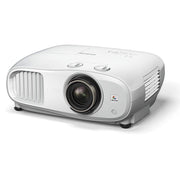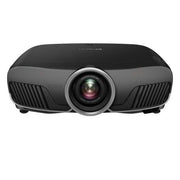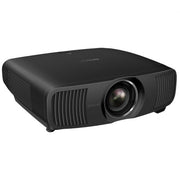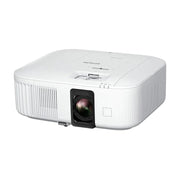There’s plenty to consider when weighing up the advantages of a projector vs TV for your home entertainment setup. Both options have their pros and cons, and some specific situations where one might just work better than the other to meet your needs. So, it’s important to first consider your needs and what it is you want to achieve with your new home entertainment setup.
With vast differences in elements like picture quality and advanced features, doing your research before your big purchase will definitely pay off in the long run.
How do projectors work?
Projectors work by taking a beam of light and turning it into a movie, game or other piece of visual media. The best projectors will do this is 4K resolution, adding great detail and a different level of brightness to an image.

LCD projectors work by shining a light through three liquid crystal panels for each primary colour, which creates an image that is then ‘projected’ through the lens onto a projector screen. DLP projectors work by beaming light through a colour wheel, reflection mirrors and then a lens. This creates pulsating shades of RGB light alternating so quickly that our brains put together a complete image.
Benefits of a projector
The reflected light this creates has been trusted in home theatres, conferences and classrooms for years now and for good reason.
Image quality
Both LCD and DLP projectors can offer high-definition or 4K images, with 2000-4000 lumens of brightness being easy to come across in many projector models. These crisp images make for a home theatre set up that feels just like going to the movies.

The reflected light that projectors produce is also much more comfortable to look at than the emitted light of a TV. They tend to be the best option for a great home theatre experience because they are so comfortable on the eyes.
Size
If you’re looking for large screen viewing, a projector is a more cost-effective way to go. A large screen TV’s 80-inches can’t compete with the 120-inch or even 200-inch images a projector can offer.
TVs cannot adjust their screen size like projectors can. A large screen TV would work in a home theatre set up, but you’re locked into one size. A projector’s adjustable size can be a great advantage, especially when you have to pay for a large TV if you want a size upgrade.
Projectors are usually the best option for medium to large rooms as they are able to produce bigger images that are best viewed from slightly further away. They are often found in home cinema rooms due to their larger screen sizes, as the last thing you want to do in your relaxing room is strain your eyes.
Portability
Projectors are not only flexible in size but also placement. They are much more portable than TVs because they are smaller and more lightweight. You could move it outdoors for a movie under the stars or easily transport it to a friend’s house for a game’s night.
Plus, the emergence of short throw projectors has made portability even easier. These can simply be placed on a shelf or console close to the projector screen for a more subtle presence in your chosen room.
Gaming
Projectors should also be considered for gaming. The most obvious advantage is that they offer much bigger images. This is especially useful when playing split-screen multiplayer games with family or friends. If you’re playing with three other people, each person’s quadrant could be almost the size of a standard TV screen, making gaming much more comfortable.

A projector’s reflected light is also more comfortable on the eyes than the emitted light of a TV—this will be a relief if you’re gaming for an extended period of time.
One thing which needs to be considered when gaming on a projector is the particular model's input lag time, the lower this number, the more suitable it will be for some serious gaming sessions.
Benefits of a TV
TVs have been the trusted centrepiece to any home entertainment set up for decades. Modern 4K TVs have incredible advanced features which give them a great technical edge.
Image quality
Due to their LED/OLED screens, TVs create a much brighter image than most projectors are able to—plus this picture quality is able to hold up better in bright rooms. As TVs are so good at fighting ambient light, they’re also able to heighten perceived contrast, resulting in a crisper image in multiple lighting situations.
Easy set up
Despite big TVs being heavy and fragile, they remain very easy to set up. In projector vs TV mounting, fitting a new TV to a wall can be done on your own without too much hassle, whereas installing a projector takes a little more time.

There is little to no planning involved with a large TV when compared to setting up a projector. There’s no need for additional equipment like an AV receiver as everything can be plugged directly into the TV itself and, in most cases, can be controlled by the TV remote.
Having to connect less equipment will also help your home entertainment set up look much tidier as any cables you do have can be neatly tucked away into a TV console.
To make set up even easier, TVs also have built in speakers so, depending on what you plan on using your TV for, you may not need to buy separate speakers. It is common to just rely on your TV speakers in your living room for example. However, if you’re looking for a true home theatre experience, these built-in speakers won’t be enough, and you will need to consider purchasing a system of surround speakers.
Advanced features
Advanced features such as 4K and 8K are often a lot more expensive in a projector vs TV. You are still able to buy a projector with these features but you could be paying more money.
You can now get innovative features including Alexa, Google Assist, Android/Google TV and other smart platforms built into both smart TVs and projectors, but some advanced image features have been around for longer in TVs and are generally cheaper. Usually, paying for a high-quality 4K TV will give you features a projector may not be able to affordably offer.
High-end OLED or QLED TV screens provide excellent colour accuracy, high built-in brightness to combat ambient light and built-in speakers that can offer great sound for basic audio needs.
Gaming
Gaming requires plenty of advanced features to ensure sharp resolution and contrast, and these features are generally cheaper in TVs. To get a similar experience with a projector you may have to look to the higher end of their price range.
TVs are great for smaller rooms as projectors work best with a larger ‘throw distance’. Plus, to appreciate the detail in your new TV you will need it set up a little closer to your seat.
TV’s will generally offer a lower input lag than projectors making them the most suitable for intense gaming sessions. While only select models of projectors specialise in lower input lag.

Epson EH-TW7100 4K PRO-UHD Home Theatre Projector

Epson EH-TW9400 4K PRO-UHD Home Theatre Projector

Epson EH-LS12000 Pro-Cinema 4K UHD Projector








